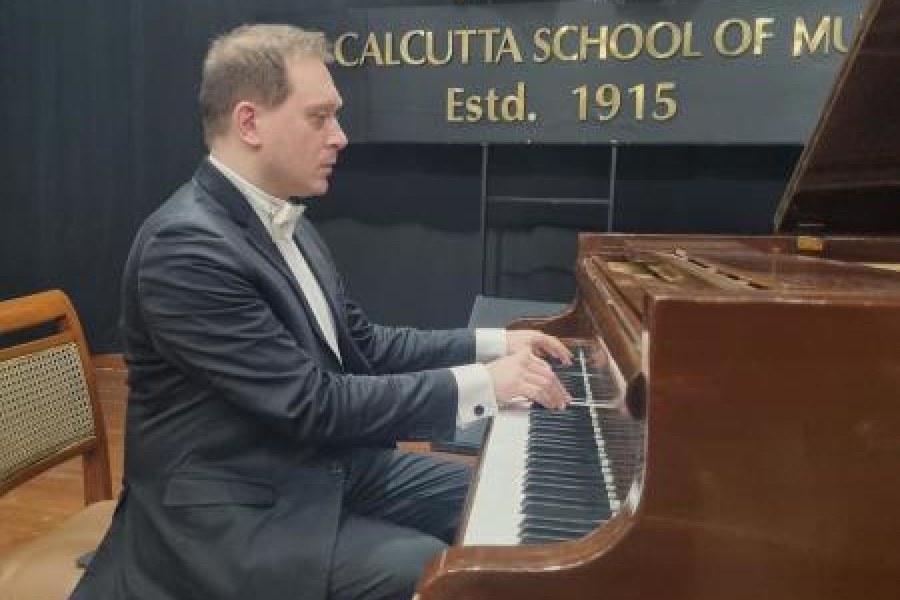The music poured out of the majestic instrument on stage and thrummed through the audience. Hearts beat faster, feet tap-tapped and heads nodded as the beauty of the composition swamped the auditorium. The man with the magic fingers was Italian pianist Daniele Buccio and the piece, Beethoven’s Piano Sonata No. 21, dedicated to the composer’s early patron Count Ferdinand Ernst Gabriel von Waldstein.
Recently, the Calcutta School of Music organised a series of performances by Buccio — all 32 piano sonatas of Beethoven in chronological order. The first one was at a five-star facility and the other three at the Sandre Hall, named after founder Philippe Sandre, of the Calcutta School of Music.
That evening at Sandre Hall, Buccio had been at the piano for nearly five hours, with only a short break in between. In the last one-and-a-half-hour session, he played the Waldstein and Appassionata, both considered quite challenging. Instead of being tired, he seems to be energised and brings the same intense focus to the conversation that he bestowed on the piano.
Buccio had his first piano lesson when he was four. “We had the instrument at home and I consciously expressed an interest in learning it,” says the 44-year-old Italian, who was born in Romeo and Juliet’s Verona.
As he tells it, the Buccio home resonated with the sound of music which his parents loved, especially his father who had a fondness for Baroque music. The boy Buccio loved playing with the sounds of piano keys and started formal lessons when he was five. Buccio Senior played the flute at home...
Just as one thinks one has got a read on what sparked the pianist’s interest in music, he steps firmly away from the personal. “I answer because you ask but this is a private matter you know, to be shared only with those I am intimate with,” says Buccio in his accented English, the harsh consonants softer, the cadence strangely lyrical. He thinks out what he wants to say first and his word choice is oddly formal. Or perhaps it is appropriate under the circumstances.
He makes it quite clear that he prefers to talk only about his work. “When we talk of Beethoven it is his music (we discuss), not his biography, yes,” he points out in his whisper-soft voice. Beethoven is one of his favourite composers of the 19th century because “he has within him all the greats who have gone before — Bach, Handel, Liszt”. Handel was also Beethoven’s best-known music teacher.
How long does one need to practise to master a sonata? “The more you work, the better the performance,” he remarks at the end of a long meandering soliloquy on musical time, form and feel, quantity and quality, and how sometimes “so many things happen within a short piece of music”.
The incredulous conclusion is that Boccio has no sense of time when he plays, he plays because he loves to, because he wants to master a piece of music and he never watches the clock. A passion and an indulgence few can think of, which is also the reason behind his magic hands. Hands that are not so magic after all, but prosaically hard working.
Boccio, from what he says, has few interests besides music. In his free time he likes listening to electronic music, to vocal music and to orchestral music, the last with an ear to perhaps recreating it on the piano.
Since 2022, he has visited multiple Indian cities — Delhi, Pune, Calcutta — but he does not think he knows enough about the country to comment on it. And no, he hasn’t found time to do any touristy things. He has had more than one collaboration with the Calcutta School of Music and he agreed to this one because both the topic and the place appealed to him. He prefers to do concerts, he says, that have a “consistent theme”. He is just as earnest about the interview and offers to send better, “meditated” answers to the questions if they are mailed to him.
And is there a place for improvisation in Western music? “In contemporary music yes but in classical mu-sic it is only the time (meaning speed of playing) that you can tinker with.” He is aware about the role improvisation plays in Indian classical music and points out, “there are rules for that too”.
He may be intensely private but Boccio’s music is expressive and fiercely performative. “Many musicians, especially those who make electronic music, are quite good to create music in solitude but I think music is best when shared with an audience. It inspires and motivates you,” is his sole voluntary observation. A pause and then he remarks, “But that does not answer your question, yes?”










